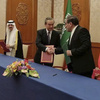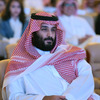Delegates attend a prep meeting ahead of the Arab League summit in Jeddah, Saudi Arabia, on Thursday.
AFP via Getty Images
hide caption
toggle caption
AFP via Getty Images


Delegates attend a prep meeting ahead of the Arab League summit in Jeddah, Saudi Arabia, on Thursday.
AFP via Getty Images
JEDDAH, Saudi Arabia — Arab League summits are often slammed by skeptics for being staid, dysfunctional and toothless.
But this year’s summit, starting Friday in the city of Jeddah, offers Saudi Arabia a platform to flex its diplomatic muscles and showcase its growing role as a mediator as it resists pressure to pick sides in the larger competition for power between the United States and Russia.
And in a region gripped by diverging interests and multiple conflicts, there’s significance and promise in seeing Arab leaders sitting in a circle — literally — and listening to one another.
Yet, more important than what’s said is sometimes who said it.
Years ago, Syria’s Arab League seat was given to a figure from the country’s opposition. This Friday, it will be President Bashar Assad commanding Syria’s place after nearly 12 years of suspension from the league for a devastating civil war that killed hundreds of thousands of people, displaced millions and tore apart a founding member state of the Arab League.
His attendance marks the culmination of steady efforts to bring Syria back into the Arab fold, ending the country’s regional isolation and turning a page on past Arab efforts to topple him.
Syria’s return to the Arab League this year reflects a much larger realignment shaping the region after Saudi Arabia and Iran restored diplomatic ties in a deal brokered by China.
Here’s a look at this year’s summit and why it matters:
What’s the Arab League anyway?


Heads of Arab states are seated around the table at a summit meeting in Khartoum, Sudan, Aug. 30, 1967.
AP
hide caption
toggle caption
AP


Heads of Arab states are seated around the table at a summit meeting in Khartoum, Sudan, Aug. 30, 1967.
AP
The Cairo-headquartered bloc was formed 78 years ago by a common, if imagined identity of what it means to be “Arabic-speaking” peoples. Its founding members included Egypt and Syria, before expanding to its current membership of 22 countries.
Although several of its members over the years have normalized relations with Israel, the Arab League continues to uphold the Palestinian cause as one of its most important missions. Palestinians have full membership in the bloc, despite not having an independent state.
The organization’s members frequently share common policy goals, with deep military and trade links among the neighbors. But there are also deep divisions and competing interests among and within member states.
Sudan’s military leader is not expected to attend, though one of his Cabinet officials will. Gen. Abdel-Fattah Burhan is leading the army in a fight against his former deputy, Gen. Mohamed Hamdan Dagalo, who leads a band of militia forces.
Also absent this year will be United Arab Emirates President Sheikh Mohammed bin Zayed, who instead is dispatching his brother, Vice President Sheikh Mansour bin Zayed. Although Sheikh Mohammed’s absence from the Jeddah summit is apparently due to prior commitments, it comes amid a backdrop of increased tensions and rivalry with Saudi Arabia’s crown prince.
The bloc’s membership spans across the Levante region, the Gulf and Africa with countries like Cameroon and Djibouti among its members. Its most influential countries have traditionally been Egypt and Saudi Arabia, as well as Jordan, Iraq, the United Arab Emirates and Qatar.
Why is Syria allowed back into the Arab League?
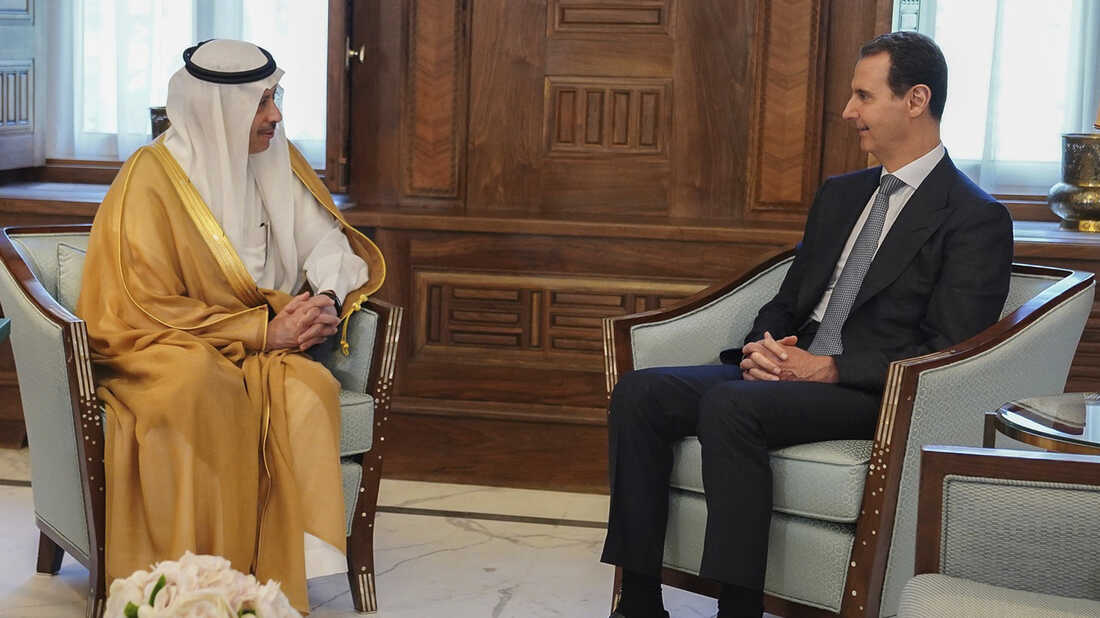

In this photo released by the official Facebook page of the Syrian presidency, Syrian President Bashar Assad (right) meets with Saudi Arabia’s Ambassador to Jordan Nayef al-Sadiri, in Damascus, Syria, May 11. Saudi Arabia invited Assad to attend the upcoming Arab League summit.
Syrian Presidency Facebook page via AP
hide caption
toggle caption
Syrian Presidency Facebook page via AP
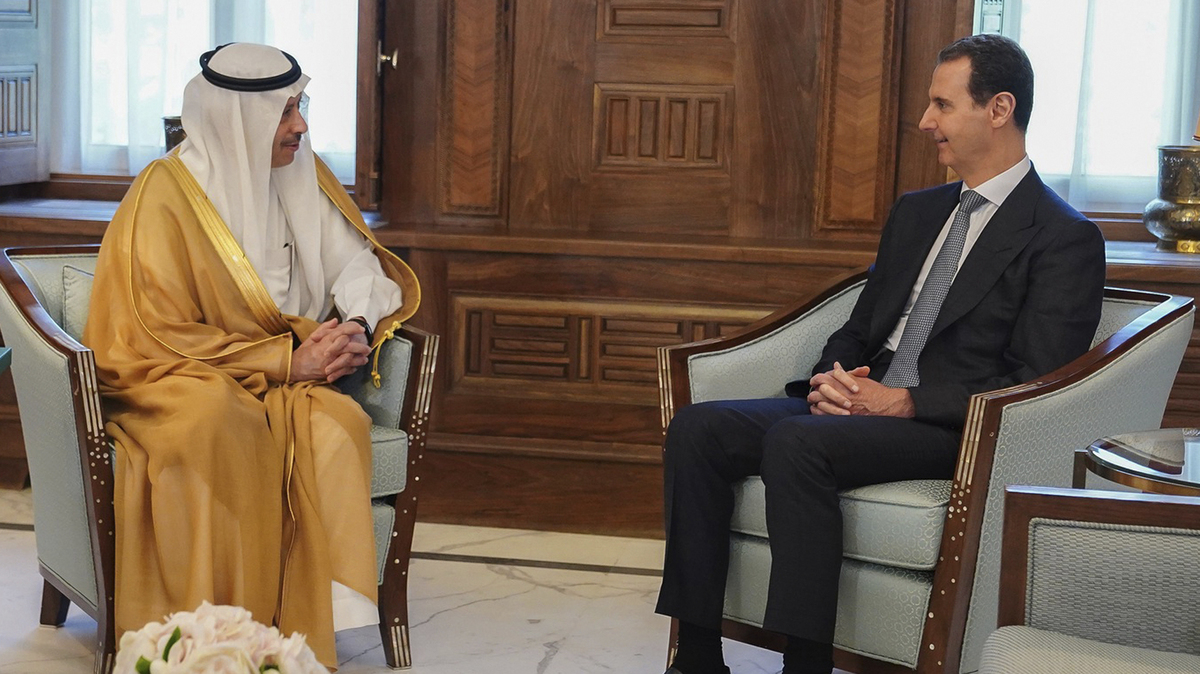

In this photo released by the official Facebook page of the Syrian presidency, Syrian President Bashar Assad (right) meets with Saudi Arabia’s Ambassador to Jordan Nayef al-Sadiri, in Damascus, Syria, May 11. Saudi Arabia invited Assad to attend the upcoming Arab League summit.
Syrian Presidency Facebook page via AP
The earthquakes that devastated parts of Syria and Turkey earlier this year sped up efforts to rebuild ties with Syria‘s government as Arab states rushed to provide emergency aid. The United States even eased its crippling sanctions on Syria for six months to alleviate barriers to aid reaching people there.
Countries like Jordan, Iraq and Lebanon, which are each facing economic challenges, want the Syrian regime to ensure the safe return of huge numbers of Syrian refugees being hosted in these countries.
Arab Gulf states, like Saudi Arabia and the United Arab Emirates, want Syria to end its lucrative drug-smuggling trade into their borders. They also want to help rebuild Syria and restart investments in the country.
Still, there are countries like Qatar and Kuwait that are not normalizing ties with Syria just yet and are demanding greater political concessions from the Syrian regime first.
Syria was suspended from the Arab League in 2011 at a time when countries like Saudi Arabia and Qatar were seeking to punish the regime for its suppression of protesters. These countries supported the mostly Sunni Muslim fighters seeking to topple Assad, who was backed by Iranian Shiite militias.
Russia and Iran’s support for Assad’s government ultimately helped him stay in power. The conflict also later drew extremist groups like al-Qaida and the Islamic State, which the U.S. and its Mideast allies, as well as Iran, fought in air raids and on the ground.
The U.S., which maintains several hundred counterterrorism forces in Syria’s northwest, has refused to restore ties with the Assad regime and publicly opposes Arab states doing so.
What’s the impact of Saudi leadership of the Arab League at this year’s summit?
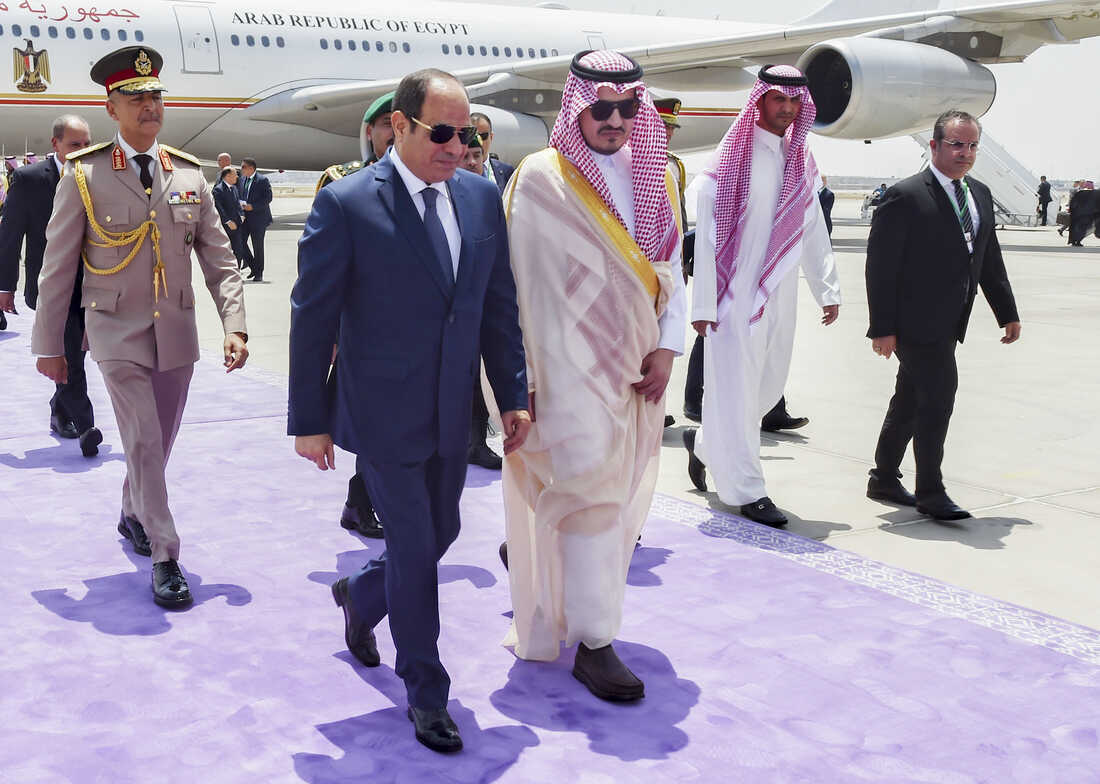

In this photo provided by Saudi Press Agency, Egyptian President Abdel-Fattah Sissi is accompanied by Saudi Prince Bandar Bin Sultan upon his arrival at Jeddah airport, Saudi Arabia, Thursday, ahead of the Arab summit.
Saudi Press Agency via AP
hide caption
toggle caption
Saudi Press Agency via AP


In this photo provided by Saudi Press Agency, Egyptian President Abdel-Fattah Sissi is accompanied by Saudi Prince Bandar Bin Sultan upon his arrival at Jeddah airport, Saudi Arabia, Thursday, ahead of the Arab summit.
Saudi Press Agency via AP
Saudi Arabia holds the rotating presidency of the Arab League at a time when the kingdom’s ascendancy as an economic and political powerhouse, combined with its religious significance as the birthplace of Islam, is unmatched in the region.
It also marks the first high-level summit for the Arab League since Saudi Arabia and Iran agreed to resume diplomatic ties. That deal, brokered by China, laid the ground for Saudi Arabia’s resumption of ties with Syria. It also renewed efforts to end the war in Yemen, including the release of hundreds of prisoners of war in recent weeks.
These major policy shifts by Saudi Arabia affect the tone and significance of this year’s Arab League summit in Jeddah.
Crown Prince Mohammed bin Salman, once shunned by Western business leaders and politicians for the kingdom’s human rights record after the killing of Saudi critic and writer Jamal Khashoggi in 2018, is now emerging as mediator in multiple conflicts.
Currently, Saudi Arabia is hosting U.S.-backed talks between Sudan’s warring sides and led the evacuation effort of thousands of foreigners from the country.
The kingdom has helped mediate prisoner swaps in the war in Ukraine, including a high-profile release between Russia and the U.S.
Saudi Arabia has refused to picks sides in the Russia-Ukraine conflict, despite pressure and criticism from Washington of its energy pact with Russia that’s helped keep oil prices higher. Saudi Arabia has also maintained close economic ties with China while still heavily relying on the U.S. for its defense capabilities.
This story originally appeared on NPR


